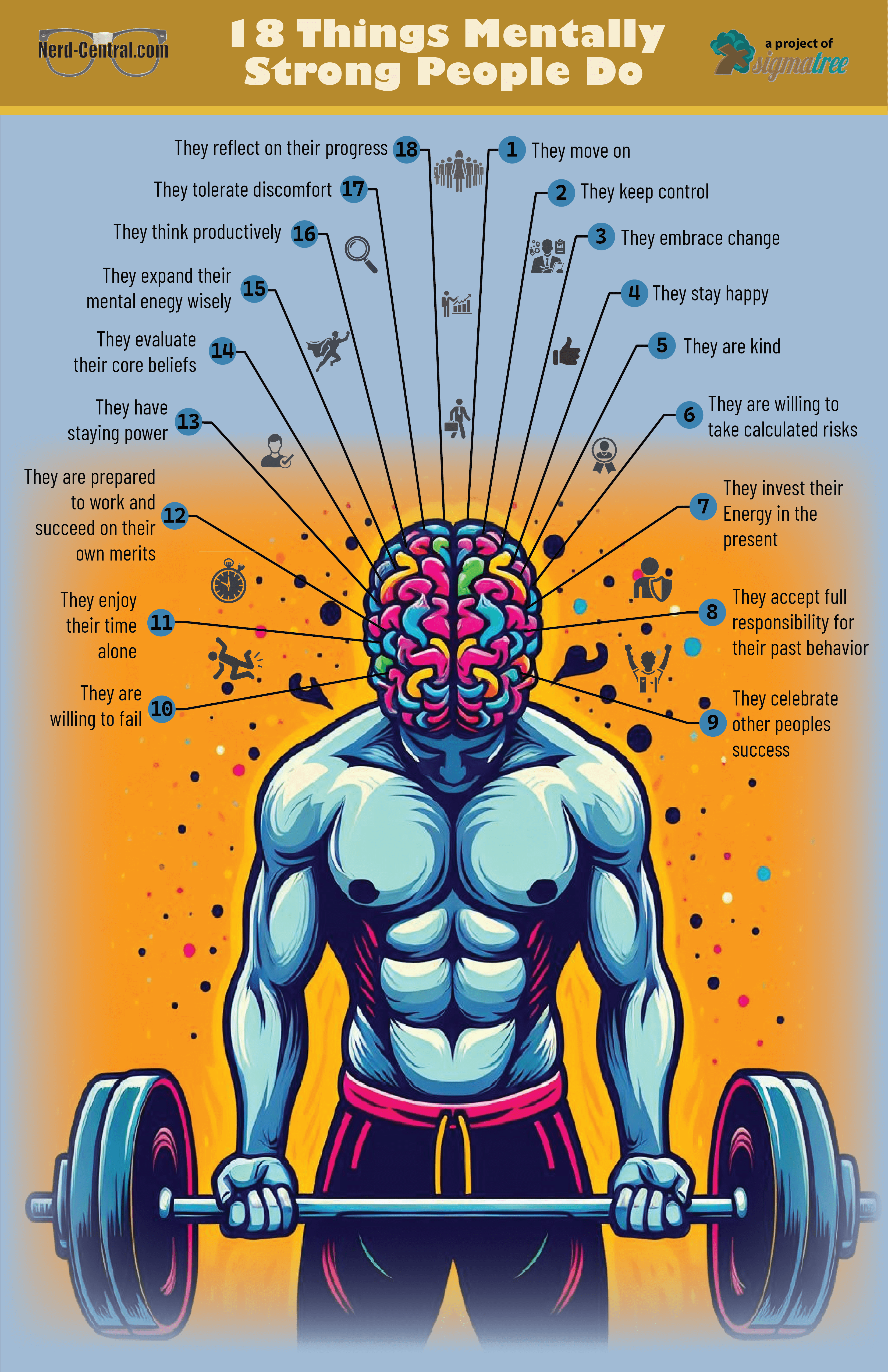Below are 18 areas that mentally strong people practice. In each one I have researched tips or steps that can help to develop or strengthen that particular characteristic. As you read through this list you will notice some of the suggested tips or steps carry over into other characteristics; such as self-care, mindfulness, generosity, gratitude, compassion, no complaining, etc. Each of the characteristic areas can and should be focused on individually to help build a mentally stronger “YOU”.

1 – They “Move On” – To move on can mean several things but for this discussion moving on is to focus on not dwelling on something that does not help meet your goals. It is the encouragement of others or self-encouragement of just letting go and accepting what happened or what is happening. This is not an easy task, it takes intentional focus. Here are 15 steps for how to move on.
- Look at your life as a journey.
- Silence your inner critic.
- Reflect realistically.
- Let go of fantasy.
- Feel the feelings.
- Talk about it.
- Explore your attachment style.
- Believe in yourself.
- Embrace self-compassion.
- Practice mindfulness.
- Don’t ruminate.
- Find a support team.
- Practice self-care.
- Try new things.
- Practice generosity.
2 – They Keep Control – Keeping your control can sometimes be just a manner of taking deep breaths, focusing on calming yourself and rethinking or rationalizing an appropriate outcome. Realizing that you cannot control all things. There are 6 strategies for strengthening your self-control.
- Tackle your most difficult tasks first.
- Change the environment to change your behavior.
- Track your progress.
- Watch yourself in action.
- Allow yourself your distractions, just not now.
- Sometimes, just give in.
3 – They Embrace Change – It’s not uncommon to worry about the ramifications of change. Whether it comes from our own decisions or forces beyond our control, change in our personal and professional lives can be intimidating, but it’s often necessary to keep growing and evolving. Here are 14 ways to embrace and accept change.
- Prepare for it.
- Determine the value of the change.
- Keep your skills current.
- Think about the possibilities if the change is embraced.
- Always run toward only what you want.
- Allow change to reveal your strengths.
- Redefine change to be your “Nirvana”.
- Don’t view relapses as failures.
- Be consistent in your actions and motivation.
- Don’t just embrace change, drive it.
- Get an accountability partner.
- Create an achievable roadmap to change.
- Reduce the ambiguity and build clarity.
- And most importantly, make change an adventure.
4 – They Stay Happy – Regardless of your version of true happiness, living a happier, more satisfied life is something worth striving for. A few tweaks to your regular habits like getting more sleep and exercise can help you get there. Here are 27 habits to add to your routine that will help build your version of happiness.
- Smile.
- Exercise.
- Get plenty of sleep.
- Eat with mood in mind.
- Practice gratitude.
- Give a compliment.
- Breathe deeply.
- Acknowledge the unhappy moments.
- Keep a journal.
- Face stress head-on.
- Avoid comparing yourself to others.
- Declutter.
- See friends.
- Plan your week.
- Ditch your phone.
- Get into nature.
- Explore prayer and meditation.
- Consider therapy.
- Find a self-care ritual.
- Give Back.
- Do your favorite thing.
- Create a thought list.
- Take time to reflect.
- Reevaluate your goals.
- Take care of your one and only body.
- Let go of grudges.
- Plan a trip.
5 – They are Kind – To learn how to be kind and loving, first you need to have a sense of what it is. Kindness is about giving of oneself freely, for the pure reason of helping others without an expectation of reciprocity or strings attached. Admittedly, that’s not always easy! For many people, life’s challenges can make kindness a bit of an afterthought. Here are few ways to help with the development of kindness.
- Be more easygoing.
- Connect with others.
- Share a laugh.
- Smile like you mean it.
- Stop and practice gratitude.
- Be aware of your power.
- Learn to listen.
- Connect in person, not just over text or social media.
- Be kind to yourself.
- Keep your kindnesses to yourself – Don’t share it with the World.
- Know your limits.
- Practice unconditional kindness.
- Put yourself in other people’s shoes.
- Experiment with letting compliments flow.
6 – They are Willing to Take Calculated Risks – Every decision you make in the business world has some sort of risk attached. The key to being successful in the long run is taking calculated risks that minimize negatives and maximize positive outcomes. 6 things to remember as you address risk.
- Do lots of research.
- Anticipate mistakes.
- Set checkpoints and goals.
- Be willing and ready to pivot.
- Learn to love the word “No”.
- Jump in when the risk feels good. Then say “Yes” to calculated risks.
7 – They Invest their Energy in the Present – There are two sides to this equation: we can fill our energy tanks more fully and frequently, or we can spend our energy more strategically. One or both of these is crucial if we want to bring our strongest, most productive energy to our most important work and life experiences. Here are 5 steps to manage your energy.
- Notice your energy and where you spend it.
- Know what brings value to your life, both joy and productivity.
- Plan your energy investment wisely.
- More importantly, plan where NOT to invest your energy.
- Don’t spend your energy thinking about how to invest your energy – start with the little things.
8 – They Accept full responsibility for their past behavior – Taking responsibility for your behavior is an important step towards personal growth and self-improvement. Here are some tips to help you accept full responsibility for your behavior.
- Stop blaming other people.
- Accept negative emotions.
- Act, don’t react.
- Practice self-compassion.
- Stop Complaining.
- Don’t give excuses.
- Set goals and try to achieve them.
- Love yourself.
- Take responsibility for your relationships.
- Walk the talk.
9 – They Celebrate other Peoples Success – Celebrating the success of others can be very challenging. Jealousy is usually the culprit here. But here are 6 reasons why you should start applauding the success of others.
- It conditions you for your own success.
- You’ll transcend yourself and possibly be a part of something bigger than yourself.
- It generates abundance.
- It kills the ego.
- You’ll extend your network.
- It helps you accept yourself.
10 – They are willing to Fail – No one likes to fail, but in reality, failure teaches valuable lessons that can make your successes far more powerful and long lasting. The key is to experiment often – to try different approaches until you find the one that works best. Making a series of small bets is the best way to come up with big results. Use these 7 tips to fail in better ways.
- Be helpful.
- Be supportive.
- Talk about failures.
- Be courageous and honest.
- Manage shifts in projects.
- Watch for potential traps.
- Build resilience.
11 – They Enjoy their Time Alone – Learn to embrace being alone. Solitude is a time for reflection, for thinking about things more deeply. In a world increasingly focused on speed and competitiveness, solitude is precious and something to be treasured. Being comfortable alone is a sign of healthy self-esteem. Here are a few tips that can help.
- Avoid comparing yourself to others.
- Go do something you like.
- Get physical and spend time with nature.
- Lean into the perks of being alone and appreciate the solitude.
- Learn new things or pick up new hobbies.
- Do the things you need to get done.
- Make it relaxing, restorative and soothing.
12 – They are Prepared to Work and Succeed on their own Merits – Success is often defined as the ability to reach your goals in life, whatever those goals may be. In some ways, a better word for success might be attainment, accomplishment, or progress. It is not necessarily a destination but a journey that helps develop the skills and resources you need to thrive. Here are 9 thoughts that can help you build success.
- Build a growth mindset.
- Improve your emotional intelligence.
- Develop mental toughness.
- Strengthen your willpower.
- Focus on intrinsic motivations.
- Set achievable goals.
- Nurture traits linked to high potential.
- Cultivate a strong social support.
- Avoid burnout.
13 – They have Staying Power – Knowing “who you are” and “what you know” might sound rather obvious, but when you start to stray from being empowered, you need to go back to the basics and grounding posture. Knowing who you are is about knowing your strengths. Begin your acknowledgment of self with “I am” statements. For example, “I am successful at _____.” Stating what you know completes the sentence. Following are a few suggestions that might help you focus on your staying power.
- Be secure in yourself.
- Communicate clearly.
- Be enjoyable to talk to.
- Have confidence in yourself.
- Don’t waste energy complaining.
- Accept responsibility for how you feel.
- Establish healthy boundaries.
- Practice forgiveness.
- Know your values.
- Don’t waste time on unproductive thoughts.
- Avoid language that implies you’re a victim.
- Make your self-worth independent of other people’s opinions.
- Be willing to stand out from the crowd.
14 – They Evaluate their Core Beliefs – Core beliefs are our most deeply held assumptions about ourselves, the world, and others. They are firmly embedded in our thinking and significantly shape our reality and behaviors. In fact, nothing matters more than our core beliefs. They are the root causes of many of our problems, including our automatic negative thoughts. Here are some thoughts for identifying and challenging your core beliefs.
- Pay attention to automatic thoughts.
- Keep a diary that chronicles your thoughts and feelings.
- Ask yourself questions about noticeable patterns.
- Explore beliefs that have no evidence.
15 – They Expand their Mental Energy Wisely – Mental energy refers to the ability or willingness to perform cognitive tasks, like problem-solving, sustaining attention, focusing, and making decisions. Just like people need physical energy to climb a set of stairs or lift heavy objects, we also need mental energy to carry out mental work.1 When your mental energy is low and you experience mental fatigue, you may feel like you have brain fog and be easily distracted or unfocused. Here are 15 ways to improve your mental clarity and energy levels.
- Practice affirmations.
- Think positively.
- Focus on relationships that bring you joy.
- Move your body.
- Pray and/or meditate regularly.
- Focus on one thing at a time.
- Do a puzzle.
- Practice mindfulness.
- Do nothing.
- Journal.
- Make a list of the things in your head.
- Take regular breaks.
- Focus on proper sleep.
- Get a change of scenery.
- Speak to a mental health professional.
16 – They Think Productively – Research suggests that positive thinkers have better stress coping skills, stronger immunity, and a lower risk of cardiovascular disease. Taking an optimistic view rather than ruminating on negative thoughts can benefit your overall mental well-being. Fortunately, there are things that you can do to learn how to think more positively.
- Avoid negative self-talk.
- Try humor.
- Cultivate optimism.
- Practice gratitude.
- Keep practicing.
17 – They Tolerate Discomfort – Tolerating discomfort can be challenging, but it is an essential skill to develop. Remember, everyone has a threshold for being uncomfortable. The higher your threshold, the more comfortable you are with being uncomfortable. However, there are steps you can take to make stepping outside your comfort zone easier regardless of your natural comfort level. Here are some tips that might help.
- Acknowledge and accept your feelings.
- Take risks and challenge yourself.
- Try new things.
- Explore new environments.
- Practice mindfulness.
18 – They Reflect on their Progress – Reflecting on your progress is an important step in achieving your goals. It can help you identify areas of improvement, celebrate your successes, and stay motivated. Remember, reflecting on your progress is a continuous process. It’s important to take the time to reflect regularly and adjust your approach as needed. Here are some ways to reflect on your progress.
- Write down your goals.
- Set milestones.
- track your progress.
- Celebrate your success.
- Learn from your failures.
- Get feedback.
- Take action.
In summary there are a lot of characteristics that make up a mentally strong person. Each of these can and should be focused on individually. Also, most of these could and probably should be a topic unto themself.




